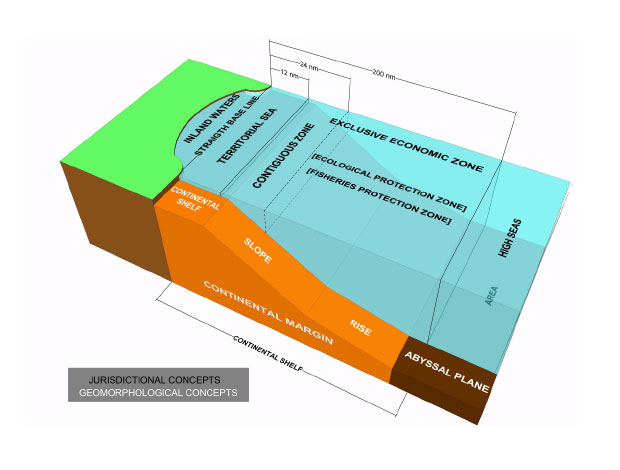Coastal states can claim five key maritime zones. Proceeding seawards from the coast they are internal waters, territorial seas, the contiguous zone, the exclusive economic zone (or, in some cases, an exclusive fishing zone) and the continental shelf. Archipelagic states may also claim archipelagic waters within their archipelagic baselines. Beyond these national zones of jurisdiction lie the international maritime zones of the high seas and the Area.
The rights of the coastal state and aliens vary in these maritime zones, and do so both spatially and functionally. Thus, the coastal state has more rights closer to shore, for example in internal waters and the territorial sea. Aliens retain considerable rights within a coastal state’s claimed maritime zones concerned with communication issues such as navigation, overflight and the laying of submarine cables and pipelines. The coastal state, in contrast, boasts significant resource related rights, particularly concerning fishing and mineral extraction from the seabed.
Tag: What are transit rights?
what is “The Right of Innocent Passage” in law of the sea and customary international law
The right of innocent passage through the territorial sea is based on the freedom of navigation as an essential means to accomplish freedom of trade. In his book published in 1758, Emer de Vattel had already accepted the existence of such a right. Subsequently, in the Twee Gebroeders case of 1801, Lord Stowell ruled that: ‘[T]he act of inoffensively passing over such portions of water, without any violence committed there, is not considered as any violation of territory belonging to a neutral state – permission is not usually required.’ It may be considered that the right of innocent passage became established in the middle of the nineteenth century. In this regard, the Report Adopted by the Committee on 10 April 1930 at the Hague Conference for the Codification of International Law clearly stated:
This sovereignty [over the territorial sea] is, however, limited by conditions established by international law; indeed, it is precisely because the freedom of navigation is of such great importance to all States that the right of innocent passage through the territorial sea has been generally recognised. what is “The Right of Innocent Passage” in law of the sea and customary international law, 1972 Convention on the International Regulations for Preventing Collisions at Sea, Article 17 of the LOSC, Article 19(2) of the LOSC, coastal State, coastal States, fishing activities, Innocent Passage, landing or taking on board of any aircraft, Lord Stowell, serious pollution, spying, territorial sea, The Right of Innocent Passage, Twee Gebroeders case, underwater vehicles


